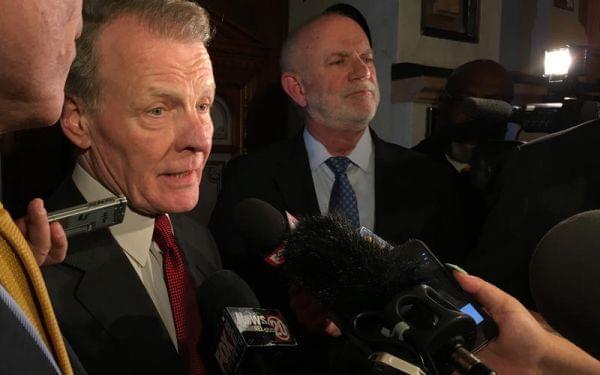Pols Point Fingers While Illinois Continues Slide

House Speaker Michael Madigan, left, speaks with reporters on Wednesday, May 31, 2017. Brian Mackey/NPR Illinois
The Illinois General Assembly ended its annual legislative session last night without agreeing on a budget. Top Democrats and Republicans blamed each other.
As Brian Mackey reports, state government's long, slow financial crisis will accelerate.
TRANSCRIPT: For more than two years, the main political divide in Springfield has been between Democrats and Republicans. But this year's budget failure exposed an additional set of fault lines — among Democrats.
The Senate spent much of the past five months in bipartisan negotiations, attempting to strike a "grand bargain" that both satisfied Gov. Bruce Rauner's economic agenda and adequately funded Illinois government.
But when those talks broke down, Senate Democrats decided to go it mostly alone, passing the bills they say they negotiated with Rauner and the Republicans.
The grand bargain became petite, but it did include a series of tax hikes, and that seems to have overwhelmed the House Democrats.
HARRIS: "So, ladies and gentlemen, our House Democratic caucus just concluded."
Rep. Greg Harris is a Democrat from Chicago.
HARRIS: "It is our decision that more work needs to be done on our budget proposal, so we will not be voting today."
Harris says his colleagues had "concerns." He blamed their failure to vote on a budget on Rauner — and the governor's intervention in grand bargain negotiations.
HARRIS: "A lot of folks have watched what has happened in the Senate, where they thought they had reached an agreement, and at the end of that agreement they found out the governor was pulling votes off the bill, and then attacking the very people who had worked on the compromise, voting for things he had previously supported."
So instead of passing a budget by the usual May 31st deadline, Harris says House Democrats will convene a series of hearings in June.
Rauner was not amused.
RAUNER: "Please, members of the General Assembly in the majority, please do not travel around the state holding sham hearings about a balanced budget."
Rauner blamed Democrats for his failure to get his budget proposal enacted — and for wrecking the grand bargain.
RAUNER: "Speaker Madigan and the House Democrats sent a lot of special interest groups, a lot of lobbyists over, pressured the Senate Democrats very harshly, and they killed the deal. They gave up at the end. And the grand bargain failed."
Rauner, however, did the same thing to Republicans, as Democratic Senate President John Cullerton pointed out.
CULLERTON: "He hijacked the grand bargain, he came in in the middle of the process, told the Republicans to vote no."
Cullerton says the same thing happened in the House.
CULLERTON: "Republicans didn't vote for anything — with some exceptions — and as a result we don't have a budget."
Meanwhile, the government functions most pinched by the lack of a budget will continue to be squeezed. Programs for vulnerable residents will continue to shut down. State universities will continue laying off staff. And schools will be left to wonder whether they'll have enough money to open their doors next August.
Everything about this might sound familiar — it's pretty much the same story we've been telling about Illinois government for two years.
But there is at least one difference this year. Rank-and-file legislators are increasingly frustrated with the constant political attacks by the leaders, parties, and outside groups. And they're beginning to say so in public.
WOJCICKI-JIMINEZ: "I understand that that is happening outside of this building, but we have got to stay focused on the goal."
Rep. Sara Wojcicki-Jiminez is a Republican from Springfield. Asked about Gov. Rauner's constant attacks on Speaker Madigan, she says it's "not helpful."
WOJCICKI-JIMINEZ: "It would not be my approach. Now is the time, through today and through the end of next month, for us to build the bridges and not burn them."
Wojcicki-Jiminez is not alone in that sentiment. Yet Democrats and Republicans don't even agree on just what in Illinois needs fixing.
And if the parties don't agree on the question, it's hard to see how they'll come to terms on an answer.
I'm Brian Mackey.
Links
- Illinois House Abandons Plans To Vote On Budget In May
- Day 700 Without A Budget; Turning Down A Dream School; NEIU Announces Layoffs
- House Dem On Budget: ‘We Can’t Do It On Our Own’
- Senate-Backed State Budget With Income Tax Hike Passes IL House Committee
- Protesters Demanding Budget Block Rauner’s Office Entrance
- Illinois Budget Fight Could Affect 2018 Elections
- State Budget Update; Programs for Supporting New Parents; Robot Bats
- GOP Rose Rips Senate Dems’ Budget Bill; Democrat Bennett Defends It
- State Senate Approves Democrat-Backed Budget Package
- LISTEN: Champaign Budget Forum

